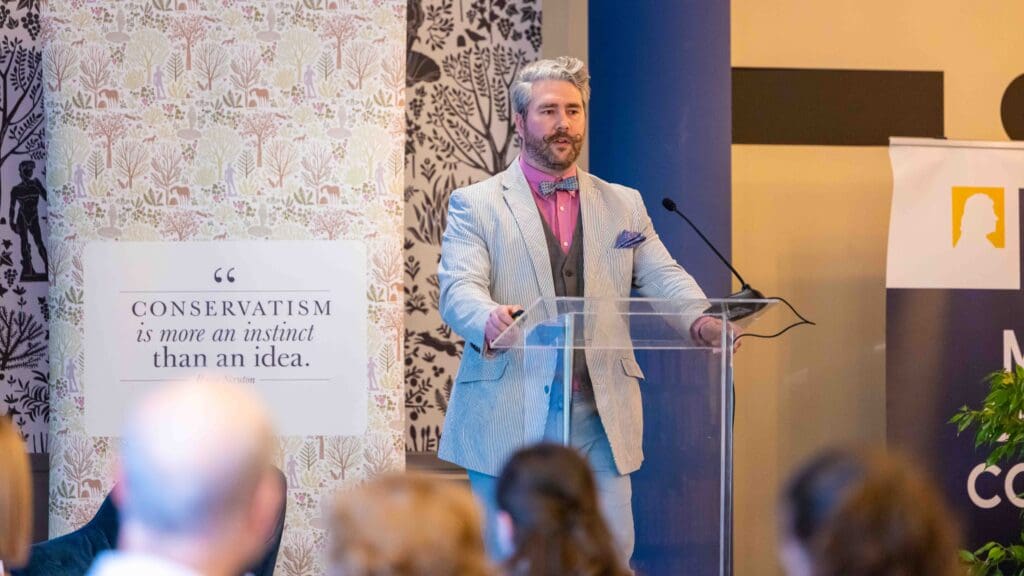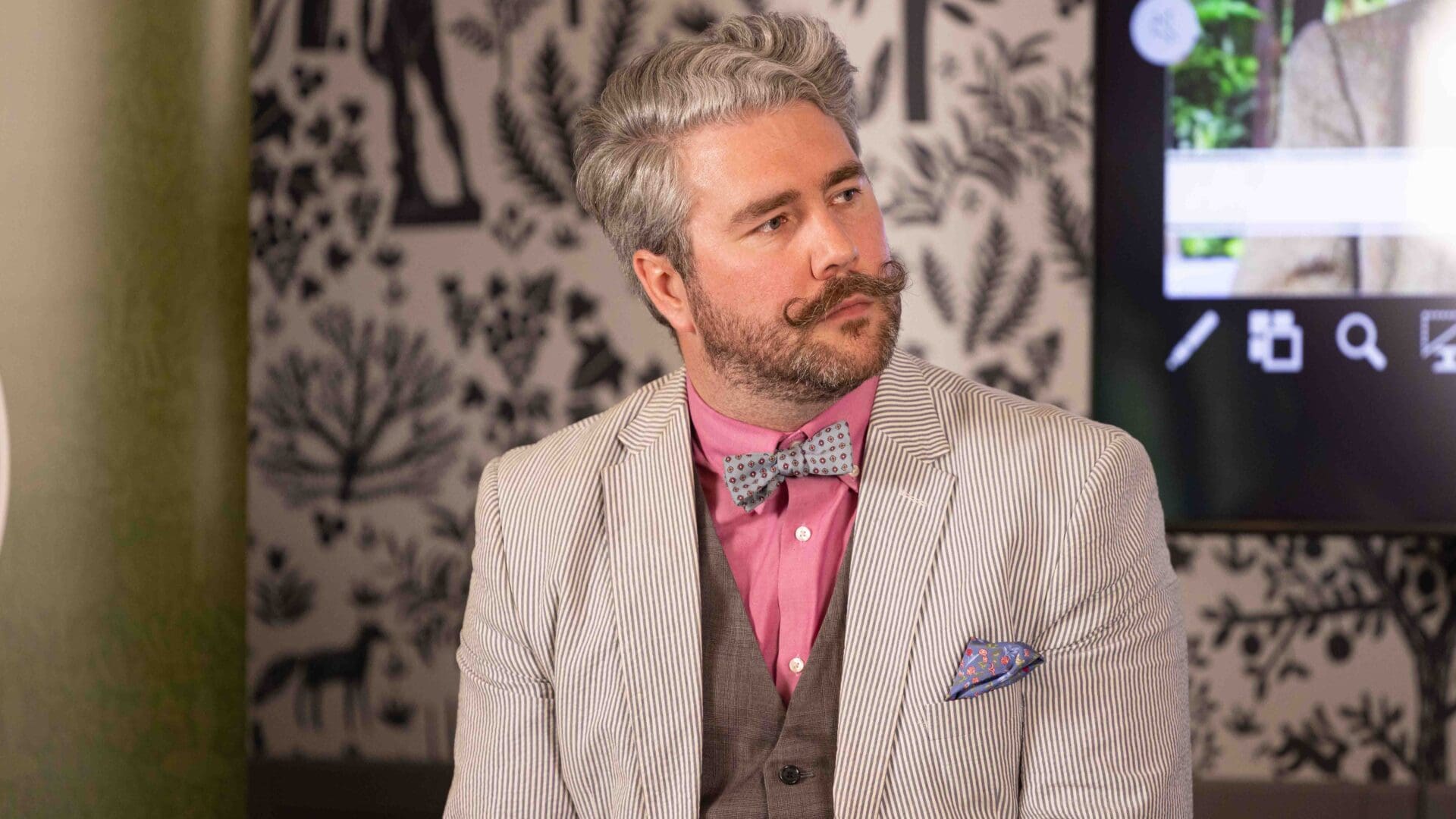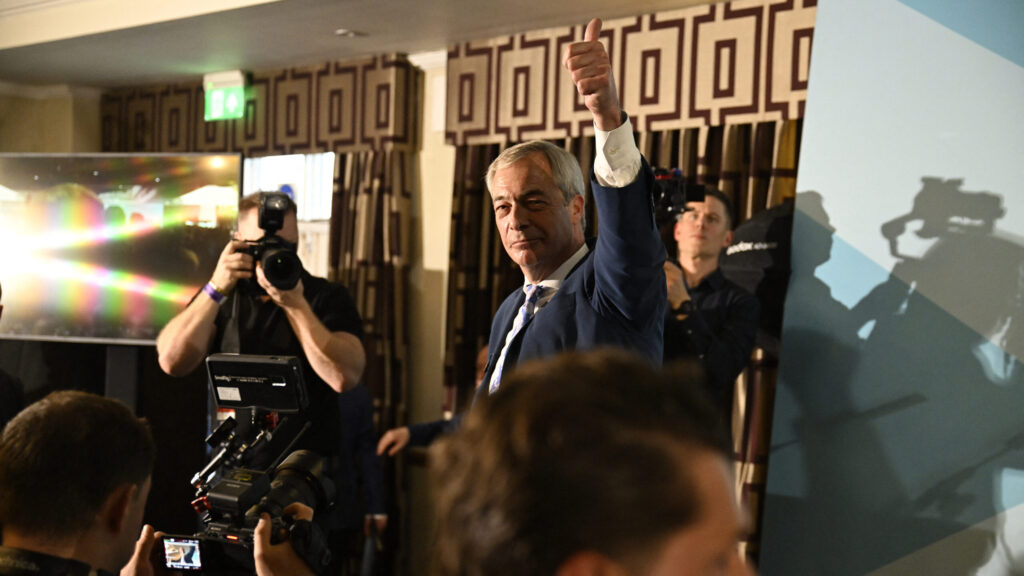Dr Daniel Pitt’s PhD is from the University of Hull where he focused on the British Constitution, conservatism and the Conservative Party. Previously, he read for an MA in political philosophy at the University of Buckingham under the supervision of Sir Roger Scruton and Dr Samuel Hughes. He has written for publications such as Conservative Home, The Critic, The Burkean, and many others. He was a member of Erewash Borough Council representing the residents of Derby Road West from 2019 to 2023 and held a Lead Member for Town Centres role. We sat down with Dr Pitt for this interview after a recent event organized by Scruton MCC where he was one of the speakers and also one of the panellists.
***
If you don’t mind, I would like to ask you first about you, but not as a person, but as a researcher. I’ve watched a podcast in which you said that you wanted to become a student of Roger Scruton, so you decided to get a second master’s at the University of Buckingham, is that right?
That’s right.
So, can you share with us what Roger Scruton was like as a teacher or a tutor?
Well, Roger Scruton, he was an excellent teacher. He would stand at the front of the table, there were about sixteen of us and we were in a function room, and he would stand at the edge of the table. It was a very intimate, small room; it was not a PowerPoint presentation. It was just handwritten notes, written with a fountain pen. And it wasn’t a full lecture written out. It was just a sort of aide-mémoire, points to make, and then he would talk.
Speak freely.
Exactly. Speak freely. And that would be about 40 minutes or so.
How long were these seminars?
It was about 40 minutes to start with. And then we had another hour and a half on top, so about two hours altogether. And then he would open up the conversation. The one thing I always found intriguing about his teaching style is that unless you knew he was a conservative before hand you would have not known, he was always extremely fair with delivering ideas, whether he was talking about Burke and Oakeshott, or if he was talking about Rousseau and Marx. He would try and explain them to the best of his ability, which I have seen a best practice and I’ve taken on as a teacher myself, that
the best way to teach is to show ideas in their best light because when you come to the criticism, your criticism is stronger
because you’ve presented them at their strongest. And that’s what Roger did in his teaching. It was very much along those lines.
Was he a reserved person?
He was reserved. Very typical. He would look at you at the side of his eye, which was slightly surreal thing when you were talking to him, he wouldn’t look you straight in the face. But he was very witty. So, he was reserved, but then next thing you know, he said something extremely funny and you’re laughing. And he was very clever. He could move from philosophy to art to politics seamlessly and say something of substance on it. So, conversation with him was never dull.
My impression is that he was, whatever that means, very British, right?
Oh, yeah. He was British, very British. English, probably, is a better description. But he also had a fondness for other countries, Hungary, Poland, for example, Czechia, he holidayed there. He lived in America,. So his Britishness didn’t exclude a love of other countries or countries where he had an existential tie. It was very much the case that you can have an adoptive country and love that country just as much. Just because you love your own country doesn’t mean you can’t love other countries.
And that takes us back to the issue of the nation states that you and your colleagues discussed this evening. And I really found it fascinating the way you compared Roger Scruton and Yoram Hazony. And this idea that basically both of them I think in various ways they said that the nation is a positive idea. It’s not like hostile or negative. You love your nation not compared to other nations but for itself.
Yes. It’s the love of your country, not the hatred of another country. Exactly. That’s what it is. It’s the love of your country, not the hatred of other countries. And that’s where boundaries come in and territory come in because, you’re not trying to expand that. And therefore, it’s not a hostile thing. It only becomes hostile, and perhaps it becomes not even what it originally was, is when it wants to expand, and then mutates, and becomes something else.

I know you’ve been here before; what is your impression of Hungarian conservatives and conservatism?
Well, first of all, hospitality has been so good, incredibly welcoming wherever I go. One thing that’s fascinating about Hungarian conservatives is that they are interested in ideas; that they come to events like this, that there are events like this. Places like Scruton VP, you can see MCC holding these events You’ve got the Hungarian Conservative magazine. You’ve got Danube Institute, and so on that are holding events constantly on what conservatism is, what the future of it is. Also, I find Hungarian conservatives are very interested in other types of conservatism, like British conservatism. And the academics that I’ve spoken to are interested in ideas, debating, discussing, learning more, engaging in knowledge exchange.
I’m biased because I’m Hungarian and conservative, but I think that Viktor Orbán is one of those leaders, for example, who read Scruton. And he’s very extensively read. I think he is also one of the rare politicians in Europe, who are conservative or populist–conservative, also because they founded their politics on ideas. Would you agree with that insight?
I think this stems from, and this is not my area of expertise, but I think this is because Hungarians went through communism, the disaster of communism, and they had to think again what Hungarian society is, what culture is, what is Hungary, and that type of situation makes you have to think. A big event happened, and this is the big difference with British conservatism—that there hasn’t been that big smack, that big change. Brexit is just a little bump compared to it. So, I think that if you’re someone like Viktor Orbán one goes back and look at things and reads. He is , of course, a student of Roger Scruton’s, which means that you’re always going to be pretty hot on these things. I believe that they first met in 1987 when I was merely a one year old.
My other question is kind of related to this. All this is very, in many ways, very theoretical. What is the usefulness of these abstract conservative ideas and discussions? How can all that, and can it, be translated into practical politics? And if yes, then does it have any relevance to the voters, the people that then these politicians are ultimately going to govern?
Well, short answer is yes. Longer answer is that you have to have different levels of political engagement. You have to win at different levels, the intellectual level, the battle of ideas level, you’ve got to win at this level. And then you’ve got the next level down, that you’ve got to win on policy, and win the debate politically, and then politicians translate these ideas into their own language and then they have to be able to convey that message to the voters. These are two different roles, but they are also overlapping. Like Edmund Burke, one of the greatest conservative thinkers, was also an active politician. So, these two levels are required within any political philosophy or political family or grouping. They have to battle on the intellectual level and the political level. And they reinforce each other. Therefore, talking about these concepts, such as the nation, is very important. It provides the concepts and the arguments to then rebut your opponents. And yes,
it does impact on the voters, but in an indirect way, through people who are community leaders, through university courses, and through politicians.
During the panel discussion you said that the Conservative party has changed also in the sense that the people who vote for the Conservative party, since about 2017, are different It’s more like working class, white, etcetera. And it’s interesting because the same thing has happened in Hungary. So, do you think this could be happening everywhere? I hear that actually is what has been happening in America as we, that similarly, Trump also has a more working-class or ‘ordinary people’ base. And why is that? Why have the, for example, working-class people, and I know this may not be necessarily your expertise, working-class people abandoned the left in many ways?
In Britain, for example, that the Labour party had a more socially conservative base. If you go back to the 50s, 60s, you start to see that they had a traditional conservative base and the people who voted for the Labour party were patriotic. They were socially conservative. They wanted a better life for their family. They wanted better working conditions, better pay and these sorts of things.
I think that’s what most sane people would want, isn’t it?
Exactly. But they think that the left had abandoned all that. It’s no longer about getting their fair share of the economic pie. It’s now -left-liberal values. It’s now ‘woke’. It’s about discussions about gender. It’s about diminishing of the national identity. It’s about criticizing national flags, not celebrating national holidays and so on. These working-class people are looking at the left and they see that the left is prioritizing culture war over economic improvement. They see that their culture and their identity is being eroded and therefore are moving towards conservatism.
My last question is about Brexit. Do you agree with Mr Balogh who during the panel discussion said that Brexit is actually, in terms of the European Union’s history, it’s actually a minor event, because much bigger things are happening, but they are sort of, as he put it, under cover? How do you see Brexit?
No, I don’t think I agree with him on that. I think it was a major event. I think it IS a major event. And I think people will look back and see it as a major event. It’s still being discussed now books and academic articles are still being written on it. The vote was in 2016. We’re now in 2024 and we’re still talking about it. It’s still being debated. I think it’s the biggest thing to happen in Britain since 1973, when Britain joined the EU, the European Communities back then.
And for the EU?
And for the EU too, to lose a country that was essentially one of the big three, Germany, France, UK. You could say Italy is part of that, but for the UK to leave was a big thing. But it wasn’t a founding member, so it probably wouldn’t be as big as if someone like France who was a founding member left, but it is still huge.
Oh, absolutely. And as it was mentioned by Mr Rosonczy-Kovács in the panel discussion, it showed that it is possible, that it can be done. Not that it’s easy, but it can happen.
Yes, that’s what it shows. It can happen. It can be done. Some people thought the European Union has only one direction, which was countries joining it, and now we see that there’s not one direction, there’s two.
Were you a Leaver?
Yes.
And are you satisfied? Do you think Brexit has been a success?
If you take sovereignty as a good thing in and of itself, then it’s a success because it’s regaining sovereignty. You can take a consequentialist argument, which is what do you do then with this sovereignty? And then you can say, well, is it a success or not. My view is that to see if Brexit is a success in consequentialist view , in terms of the consequences, we’ll have to look much further into the future for all the ramifications to play out. I think for that it’s too early. Of course, people wanted to see overnight change. People wanted change. Change has been slower than what some people wanted. But my view is that Brexit is a success because it happened.
And the will of the people prevailed despite the shameful obstructionism.
Yeah, that’s fundamental, that democracy played out. You can see how close the result was, 52–48, but there was a referendum. It was enacted by parliament. I think that was fundamental. Brexit had to happen no matter what. Even if you were not in favour of it, and I agree that the obstructionism was shameful.







